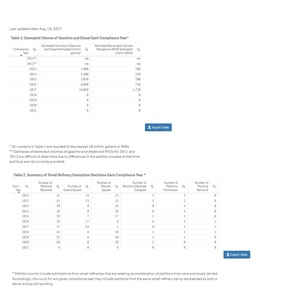EPA: No new SRE petitions filed, 3 remain pending

August 18, 2022
BY Erin Krueger
The U.S. EPA on Aug. 18 published updated data on small refinery exemptions (SREs) filed under the Renewable Fuel Standard, reporting that no new SRE petitions have been filed in the past month.
According to the EPA’s online data dashboard, three SRE petitions are currently pending, a number that has remained stable for the past two months. The SRE petitions include one each for compliance years 2016, 2017 and 2018.
Advertisement
The EPA took no action on the three pending SREs and made no changes to any of the SRE data included in its online SRE data dashboard.
The EPA’s data shows that 346 SRE petitions were filed with the agency from 2011 through 2021. Of that number 121 were ultimately approved, with 184 denied, 15 declared ineligible and 23 withdrawn. From 2013 through 2021, the number of approved SREs officially accounted for 3.12 billion renewable identification number (RINs).
The true demand destruction of the SRE petitions, however, likely surpasses 3.12 billion RINs. The EPA in April overturned 31 SRE petitions that had previously been approved by the agency. Those 31 refineries were provided with an alternative compliance approach for demonstrating compliance with their 2018 renewable volume obligations (RVOs). Under that alternative approach, the impacted refineries can resubmit their 2018 RFS annual compliance reports with zero deficit carryover and no additional RIN retirements. The agency in June extended that approach to three additional SREs denied for compliance years 2016 and 2017. Growth Energy in June filed petitions for review with the U.S. Court of Appeals for the D.C. Circuit challenging the EPA’s alternative compliance approach.
Advertisement
Related Stories
The U.S. EPA on July 8 hosted virtual public hearing to gather input on the agency’s recently released proposed rule to set 2026 and 2027 RFS RVOs. Members of the biofuel industry were among those to offer testimony during the event.
The USDA’s Risk Management Agency is implementing multiple changes to the Camelina pilot insurance program for the 2026 and succeeding crop years. The changes will expand coverage options and provide greater flexibility for producers.
EcoCeres Inc. has signed a multi-year agreement to supply British Airways with sustainable aviation fuel (SAF). The fuel will be produced from 100% waste-based biomass feedstock, such as used cooking oil (UCO).
President Trump on July 4 signed the “One Big Beautiful Bill Act.” The legislation extends and updates the 45Z credit and revives a tax credit benefiting small biodiesel producers but repeals several other bioenergy-related tax incentives.
CARB on June 27 announced amendments to the state’s LCFS regulations will take effect beginning on July 1. The amended regulations were approved by the agency in November 2024, but implementation was delayed due to regulatory clarity issues.
Upcoming Events










